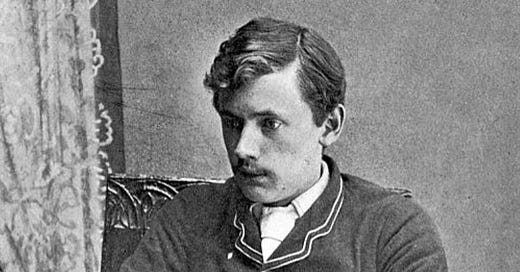Read the poem below. If it moves you, again. Return, if you feel like it, and we’ll ponder it together; if not, resume your day, you’ve better uses for your time.
Composed in 1894 by Ernest Dowson (1867-1900), these twenty-four lines haunted earlier generations, but today are seldom visited except by students laboring through anthologies. A wispy, hapless consumptive, Dowson would not have been surprised by his evanescence. His life was about death, loss, helplessness, futility, the exquisite ecstasies of sensuality and inebriation as we deliquesce. In today’s parlance he was “a loser – bigtime,” one of the so-called Aesthetic School epitomized by Whistler, Beardsley and Oscar Wilde. These hothouse plants blossomed in a fragrant overstuffed stillness difficult to envision in our roaring, plugged-in century.
Dowson’s laconic lines exude an almost fetid fragrance. The title, plucked from a poem by Rome’s Horace, reeks of sniffy disdain for any nose-to-the grindstone hoi polloi. Horace in his poem begs Venus – that is, sexuality – to go bother some other guy, he’s too old to get it up anymore. Horace is a weary fifty (this was pre-Viagra). Dowson is a weary twenty-seven, in bed with a prostitute, whose embraces he’s enjoyed, but, oh, why can’t he forget his long-ago heartthrob Cynara (pronounced SIN-a-ra), for whom he perpetually pines!
The verse, with its prissily precise meter and almost obsessive repetitions (Cynara’s name is repeated seven, “desolate” five, “fashion” and “passion” four times each, etc.), evokes a self-indulgent whiner, who gives me hives. I’m not into whores, lazing, moaning, mooning. Up and at ‘em, fella, get a life. And yet the self-depiction feels tragically honest, which entices and teases this self-depicter. We experience this long-ago scene as if present in the overwarm odorous room observing from a dark corner. We feel the luxuriant lust – “bought red mouth”: what a phrase! – and weariness, exhaustion, hopelessness, proximity of death. Somehow we know this young crooner isn’t long for this world. (Twenty-seven when he wrote the poem, Dowson would vanish into nothingness six years later.)
And while we may revile the young man’s self-indulgence, self-importance, self-pity and blood-curdling condescension to the pretty impoverished young female in his arms, we nonetheless admire the poet’s courage – to face his facts and feelings without flinching. Would I, I can’t help thinking, have the guts to reveal myself so entirely? He reiterates his loyalty to Cynara – her name conjures sin, incineration, cinders – while acknowledging his loyalty was in his imagination only, not his conduct. He has not been loyal to her – nor will he be to this prostitute or all the others he’ll caress before he expires – but he has been – “after (his) fashion” – his love has been real and hot and lasting – for where is love, after all, but in the mind?
The poet becomes, in my reading, a hero of self-acceptance. He despises himself – “desolate,” “sick,” “madder,” and “hungry” are hardly gratulatory adjectives – yet (in today’s parlance) he “is who he is” and will do his utmost to do something worthy before he dies. He will make a poem – a finely crafted poem – pulsing with passion, adroitly fashioned – and perhaps this weak meek attempt will outlive him, which it has.
We sense why Margaret Mitchell took the title for her blockbuster novel from this poem. The poet, like America’s South after our Civil War, is achingly nostalgic for a beauty that’s forever lost. That beauty may be fantastic, delusory – may never have existed – mightn’t Cynara, with her odd name, be an hallucination? – but that love pulses and propels even so. How it hurts to remember! – yet we must – until we forget.
Non Sum Qualis eram Bonae Sub Regno Cynarae
Last night, ah, yesternight, betwixt her lips and mine
There fell thy shadow, Cynara! thy breath was shed
Upon my soul between the kisses and the wine;
And I was desolate and sick of an old passion,
Yea, I was desolate and bowed my head:
I have been faithful to thee, Cynara! in my fashion.
All night upon mine heart I felt her warm heart beat,
Night-long within mine arms in love and sleep she lay;
Surely the kisses of her bought red mouth were sweet;
But I was desolate and sick of an old passion,
When I awoke and found the dawn was gray:
I have been faithful to thee, Cynara! in my fashion.
I have forgot much, Cynara! gone with the wind,
Flung roses, roses riotously with the throng,
Dancing, to put thy pale, lost lilies out of mind;
But I was desolate and sick of an old passion,
Yea, all the time, because the dance was long:
I have been faithful to thee, Cynara! in my fashion.
I cried for madder music and for stronger wine,
But when the feast is finished and the lamps expire,
Then falls thy shadow, Cynara! the night is thine;
And I am desolate and sick of an old passion,
Yea, hungry for the lips of my desire:
I have been faithful to thee, Cynara! in my fashion.







